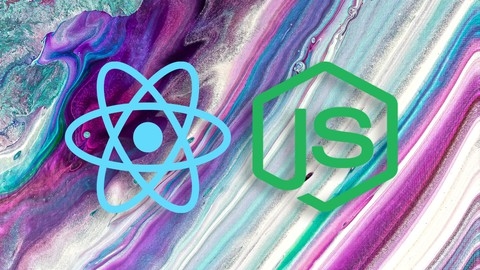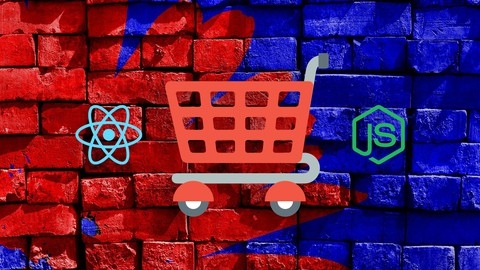The MERN stack (MongoDB, Express.js, React.js, Node.js) is a popular choice for building full-stack web applications, offering a robust and flexible framework for developing dynamic and interactive user experiences.
Mastering the MERN stack can open up opportunities for building modern web applications, web APIs, and even mobile apps using React Native.
You can create anything from e-commerce platforms to social networking sites with the MERN stack.
It’s easy to get overwhelmed searching for the right MERN stack course on Udemy.
With so many options, it can be difficult to find a program that delivers comprehensive instruction, practical projects, and expert guidance.
You’re looking for a course that’s engaging, challenging, and ultimately helps you build real-world projects.
We’ve reviewed countless MERN stack courses on Udemy and our top recommendation is MERN Stack Front To Back: Full Stack React, Redux & Node.js.
This course stands out for its comprehensive approach, covering everything from setting up the development environment to deploying a complete application.
You’ll gain hands-on experience building a real-world application, learning to integrate all the components of the MERN stack seamlessly.
This is just one of many exceptional MERN stack courses available on Udemy.
Keep reading to explore our recommendations for different skill levels and project goals, and find the perfect course for your journey.
MERN Stack Front To Back: Full Stack React, Redux & Node.js
You’ll start by setting up a MongoDB database with Atlas and connecting it to a Node.js server using Express and Mongoose.
The course dives deep into building secure user authentication with JSON Web Tokens (JWT) and implementing API routes for user registration, login, and profile management.
You’ll learn how to validate requests, create models, and implement middleware for authentication.
Once the backend is set up, you’ll move on to the frontend, where you’ll build a React application with Redux for state management.
The course covers setting up React Router for navigation and creating components for user registration and login forms.
With Redux in place, you’ll integrate alerts and build out the user authentication flow, including loading the user, setting the auth token, and implementing logout functionality.
The course then guides you through creating a dashboard and profile management system, where users can create, edit, and delete their profiles, adding details like education and experience.
You’ll also learn how to display profiles, fetch data from the GitHub API, and address console warnings.
The course dedicates a section to building out post and comment functionality, covering actions like creating, liking, unliking, deleting posts and comments.
Towards the end, you’ll prepare your application for deployment and learn how to deploy it to Heroku using the Heroku CLI.
The course also covers additional topics like creating a not-found page and addressing theme-related issues.
Throughout the course, you’ll gain hands-on experience with the MERN stack, learning how to build a full-stack application from scratch.
The instructor provides project files and links to supplementary resources like a theme-building series on YouTube.
React, NodeJS, Express & MongoDB - The MERN Fullstack Guide
This course provides a comprehensive guide to mastering the MERN (MongoDB, Express.js, React.js, Node.js) stack for building full-stack web applications.
You’ll start by understanding the big picture of how these technologies work together, followed by a deep dive into each component.
The course begins with a solid foundation in React.js, covering key concepts like components, props, state, events, and more.
You’ll build the frontend of a web app, learning best practices for structuring React components, managing state, and creating reusable UI elements.
Next, you’ll explore Node.js and Express.js, building a robust REST API to serve data to your React frontend.
You’ll learn how to handle routing, middleware, error handling, and integrate with MongoDB using Mongoose for data storage.
The course then dives into MongoDB and Mongoose, teaching you how to model data, create schemas, and perform CRUD operations.
You’ll learn to connect your Node.js backend to MongoDB, enabling seamless data flow between the frontend and backend.
As you progress, you’ll integrate the frontend and backend, making HTTP requests from React to the Node.js API.
You’ll implement features like user authentication with JSON Web Tokens (JWT), file uploads with Multer, and even leverage external APIs like Google’s Geocoding service.
The course covers deployment strategies, teaching you how to prepare your application for production using environment variables, code splitting, and deployment platforms like Heroku and Firebase Hosting.
Throughout the course, you’ll build a real-world application, applying the concepts you learn to a practical project.
This hands-on approach ensures you gain a deep understanding of the MERN stack and its implementation.
MERN From Scratch 2023 | eCommerce Platform
This course provides a comprehensive journey to build a full-stack MERN eCommerce platform from scratch.
You’ll start by setting up the React frontend, creating components like the header, footer, product listing, and details page.
Then, you’ll move to the backend, setting up an Express server to serve data.
You’ll learn to use MongoDB Atlas for your database and Mongoose to model and seed sample data.
After integrating the backend with the frontend to fetch products, you’ll implement Redux Toolkit for state management.
The course covers crucial eCommerce features like a shopping cart, allowing users to add, remove, and update quantities of items.
You’ll build authentication using JSON Web Tokens, enabling user registration, login, and protected routes.
The checkout process is split into two parts - first, you’ll create the shipping and payment method screens.
Then, you’ll integrate with PayPal for processing payments and mark orders as paid.
Users can view their order history and update profiles.
For admin functionality, you’ll build routes to manage orders, products, and users.
Admins can create, edit, delete products and upload images.
They can also list, delete, and update user accounts.
Additionally, you’ll implement product reviews, search functionality with pagination, and a product carousel.
Finally, you’ll learn to prepare your app for production and deploy it to a platform like Render.
MERN 2024 Edition - MongoDB, Express, React and NodeJS
The course covers all the essential topics for building full-stack web applications using MongoDB, Express, React, and Node.js.
You’ll start by setting up your development environment with tools like VS Code and Vite.
The course then dives into React Router for handling client-side routing and creating different pages like the landing page, register page, and login page.
For styling, you’ll learn how to use Styled Components and global CSS.
The dashboard page is a major part of the course, where you’ll build a complete dashboard with features like a navbar, sidebar, theme toggling, and logout functionality.
On the server-side, you’ll learn how to set up an Express server, handle JSON data, use middleware like Morgan and dotenv, and create routes for CRUD operations on a job database.
You’ll also integrate MongoDB with Mongoose for data storage.
User authentication is a crucial aspect covered in-depth, including user registration, login, JSON Web Tokens (JWT), password hashing, and authorization.
You’ll learn how to protect routes, handle errors, and validate user input.
The course also covers advanced topics like file uploads with Multer and Cloudinary, charting job statistics, implementing search and pagination for the job listings, and deploying your application.
Additionally, you’ll explore React Query for efficient data fetching and caching, global loading states, and security best practices.
Throughout the course, you’ll build practical projects, starting with a job tracking application and potentially extending it with bonus features.
The Full Stack Web Development Bootcamp 2024 - MERN STACK
This course starts from the fundamentals of web development and progresses towards advanced concepts and practical projects.
You’ll begin by exploring HTML, the backbone of web pages.
The course delves into the basics of HTML, including its syntax, elements, structure, and various tags like headings, lists, links, images, and forms.
You’ll learn how to create well-structured and semantically correct web pages, as well as how to style them using CSS.
Moving on, you’ll dive into CSS, the language that governs the presentation and styling of web pages.
The course covers the CSS box model, selectors, positioning techniques, flexbox, and responsive design principles.
You’ll learn how to create visually appealing and responsive layouts that adapt to different screen sizes and devices.
JavaScript, the programming language that adds interactivity and dynamic behavior to web pages, is a crucial component of the course.
You’ll learn about variables, data types, control structures, functions, arrays, objects, and advanced concepts like asynchronous programming, APIs, and DOM manipulation.
The course then shifts its focus to backend development with Node.js.
You’ll understand the importance of Node.js in modern web development and learn how to create server-side applications, handle routing, and implement middleware.
Express.js, a popular Node.js framework, is covered in-depth, including topics like rendering templates, serving static files, and handling form data.
Database management is an essential aspect of web development, and the course covers MongoDB, a popular NoSQL database.
You’ll learn how to perform CRUD operations, query data, and integrate MongoDB with your Node.js applications using Mongoose, an Object Data Modeling (ODM) library.
Authentication and authorization are critical components of secure web applications, and the course covers various authentication strategies, including cookie-based, session-based, and JSON Web Token (JWT) authentication.
You’ll learn how to implement user registration, login, and authorization mechanisms.
The course also introduces you to React.js, a popular JavaScript library for building user interfaces.
You’ll learn about components, state management, routing, and integrating React with backend APIs.
Additionally, you’ll explore advanced topics like the Context API and useReducer hook.
Throughout the course, you’ll work on several practical projects, including a full-stack blog application, an income-expense tracker app, and an AI content generator using OpenAI’s ChatGPT.
These projects will reinforce your understanding of the MERN stack and provide you with hands-on experience in building real-world applications.
The course also covers essential topics like error handling, design patterns (MVC), file uploads to the cloud, Git and GitHub for version control, and deployment strategies.
MERN Stack React Node Ecommerce from Scratch to Deployment
The course covers everything from setting up the project to deploying a fully-functioning e-commerce application.
You’ll start by learning how to set up the Node.js backend, including Express server configuration, connecting to MongoDB Atlas, defining routes and controllers.
The course then dives into user authentication, implementing signup, signin, and signout functionality using JSON Web Tokens (JWT).
Once the authentication is in place, you’ll learn to create middlewares for authorization, handling admin roles, and building out the product and category models.
The course covers advanced topics like sending products with query parameters, handling file uploads, and implementing search functionality.
On the React front, you’ll learn about React Hooks (optional) before building the main application.
You’ll create pages, layouts, and components for user authentication, displaying products, implementing shopping cart functionality, and integrating payment gateways like Braintree for credit card and PayPal payments.
The course doesn’t stop there – it also covers order management, allowing users to view their purchase history and admins to manage orders and products.
You’ll even learn how to deploy the application to a production environment, set up a domain, use a CDN, and configure free SSL.
Throughout the course, you’ll work with real-world examples, building a fully-functional e-commerce application step-by-step.
The instructor provides clear explanations, and you’ll have access to source code for each lecture, making it easy to follow along.
If you’re new to JavaScript, React, or Node.js, the course includes optional lectures to get you up to speed.
MERN Stack E-Commerce Mobile App with React Native [2023]
The course covers building a real-world e-commerce application from scratch using React Native for the frontend and Node.js, Express, and MongoDB for the backend.
You’ll start by setting up the development environment, including installing necessary tools like Node.js, Expo, Android Studio, and code editors.
The course then dives into building the backend API using Express, connecting to a MongoDB database, and creating routes for handling products, categories, users, authentication, orders, and image uploads.
Once the backend is set up, you’ll learn React Native fundamentals by building a simple Todo List app.
This hands-on project will teach you about components, state management, styling, and user input handling.
With the fundamentals covered, you’ll begin working on the actual e-commerce app, starting with the product listing and category filtering.
You’ll use libraries like React Navigation for navigation between screens and Redux for state management.
The course covers building the cart functionality, checkout process, user authentication, and an admin panel for managing products, categories, and orders.
Along the way, you’ll learn about useful techniques like using Context API for state management, styled components for consistent styling, and integrating with native device features like the photo library.
The course also covers deploying the app to both Android and iOS platforms.
React Node MERN Stack from Scratch building Social Network
The course starts by introducing you to modern JavaScript concepts like arrow functions, destructuring, and classes.
It then dives into learning Node.js, covering topics like the event loop, asynchronous programming, and using Express.js.
Next, you’ll learn React from the ground up, including creating components, handling state, making API requests, and styling with CSS-in-JS.
The course guides you through building the server-side with Node.js, covering routes, middlewares, controllers, and connecting to MongoDB using Mongoose.
As you progress, you’ll implement core features like user authentication, post creation with image uploads, rendering posts, updating and deleting posts, user profiles, following/unfollowing users, liking/unliking posts, commenting on posts, and pagination.
The course also covers advanced topics like server-side rendering, real-time updates with Socket.io, admin access, password reset, and social login.
You’ll learn to integrate various libraries and tools, such as React Router, Ant Design, React Quill, Cloudinary, and JSON Web Tokens (JWT).
The instructor provides hands-on experience by walking you through building the complete social network application step-by-step.
Towards the end, you’ll learn how to deploy the application to a production environment like Digital Ocean.
The course wraps up with bonus content on implementing custom reCAPTCHA, super admin functionality, and securing social login.
React Redux Ecommerce - Master MERN Stack Web Development
The course begins with live demos showcasing the final product’s user interface and functionality, including the user and cart system, search and filtering capabilities, rating system, and admin dashboard.
You’ll start by setting up the React frontend, implementing routing, and integrating Ant Design components.
Firebase authentication is then introduced, allowing users to register, login, and reset passwords.
Redux is utilized to manage the application’s state, including the current user.
The Node.js and MongoDB backend is established next, covering API creation, routing, controllers, and user schema setup.
Firebase is integrated on the server side for authentication checks and role-based access control.
The course dives into building the core e-commerce features, such as creating, reading, updating, and deleting categories and subcategories.
You’ll learn how to create products associated with these categories, handle multiple image uploads using Cloudinary, and implement sorting, filtering, pagination, and carousels for displaying products.
A key highlight is the implementation of an advanced star rating system, allowing users to rate products and displaying average ratings.
The course also covers searching and filtering products based on various criteria like text, price range, categories, ratings, brands, colors, and shipping options.
The shopping cart functionality is thoroughly explored, including adding products, updating quantities, removing items, and persisting the cart data.
The checkout process is implemented, with coupon integration, Stripe payment processing, order creation, and updating product quantities based on purchases.
You’ll build a user dashboard for viewing order history, with the ability to download PDF invoices.
The admin dashboard allows managing orders, updating their status, and viewing product details.
Additional features like wishlists and cash on delivery (cashless orders) are also covered.
Finally, the course guides you through deployment using Heroku, Digital Ocean, NGINX, and MongoDB setup.
Throughout the course, you’ll gain hands-on experience with React, Redux, Node.js, MongoDB, Firebase, Ant Design, Cloudinary, Stripe, and various other libraries and tools essential for building robust MERN stack applications.
MERN React Node Next.js Multi User SEO Blogging Platform
The course starts by introducing you to Node.js and setting up the server-side API with MongoDB Atlas as the database.
You’ll learn how to separate routes and controllers, a fundamental concept in building APIs.
Next, you’ll dive into user authentication, covering signup, signin, and signout functionality.
The course uses JSON Web Tokens (JWT) for authentication and teaches you how to implement protected routes for admin users.
Once the backend is set up, you’ll move to the frontend using React with Next.js.
You’ll build components for navigation, forms, and displaying data from the API.
The course covers integrating ReactStrap for styling and handling environment variables.
With the basics covered, you’ll learn to create APIs for categories, tags, and blogs.
On the frontend, you’ll build pages to create, read, update, and delete categories, tags, and blogs.
The course uses the Quill rich text editor for blog content and teaches you how to upload images.
The course emphasizes SEO by showing you how to generate blog excerpts, create SEO-friendly pages for categories and tags, and implement features like related blogs and search functionality.
You’ll also learn how to create a public profile page for users, where you can view their blogs and update your profile information, including uploading a profile photo.
The course covers additional features like creating blogs for authenticated users, handling token expiry, integrating Disqus for commenting, sending emails with Sendgrid, password reset functionality, and account activation on signup.
Social login with Google is also included, along with integrating Google Analytics and creating a static home page.
Finally, you’ll learn how to deploy your application to Digital Ocean, use Cloudflare for CDN and SSL, and configure your domain name.
Also check our posts on:
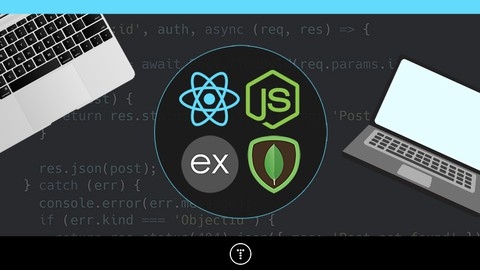

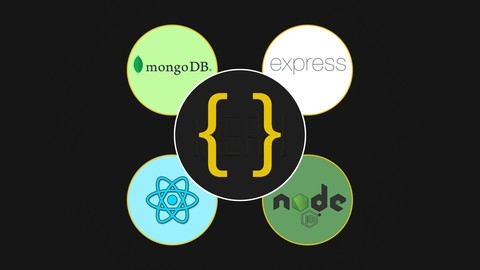
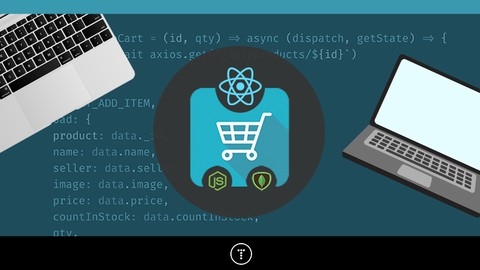
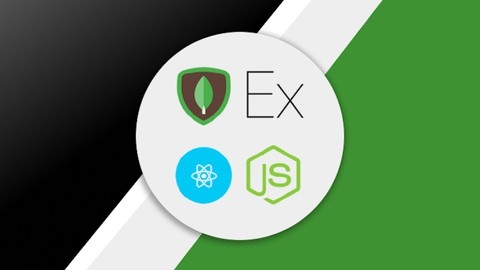
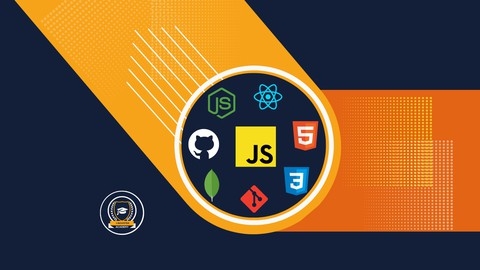

![MERN Stack E-Commerce Mobile App with React Native [2023]](/img/best-react-native-courses-udemy/3655146_MERNStackE-CommerceMobileAppwithReactNative2023.jpg)
